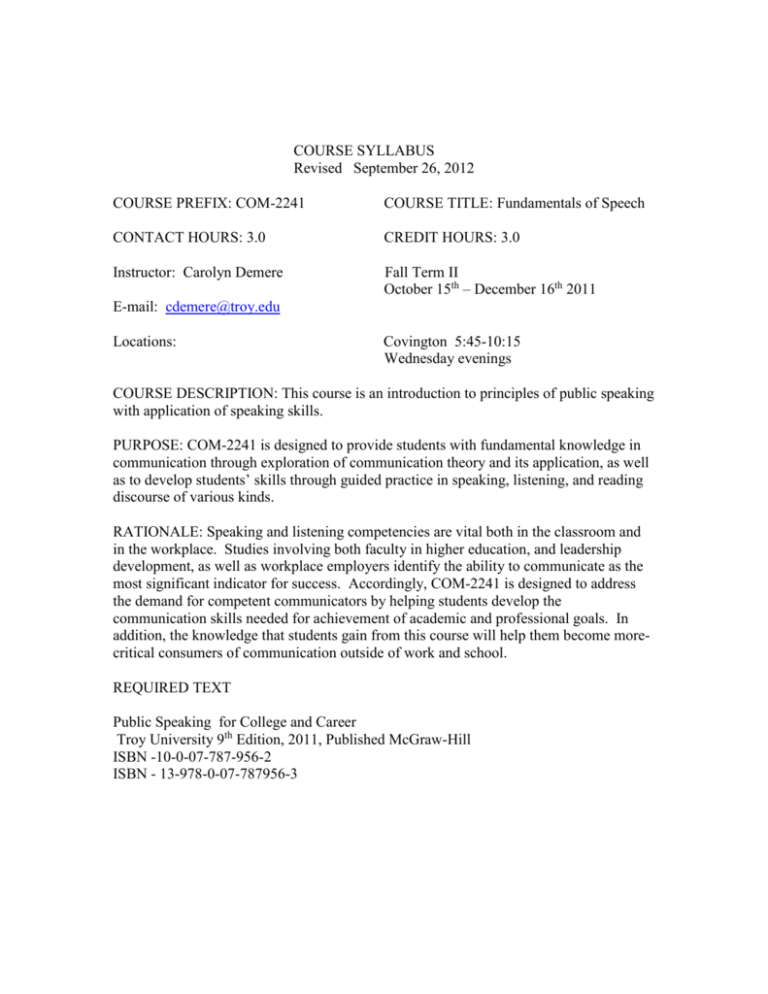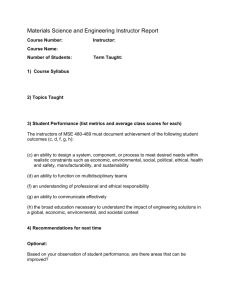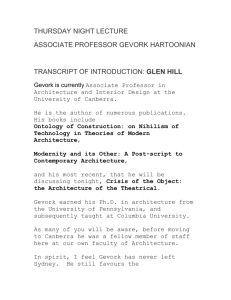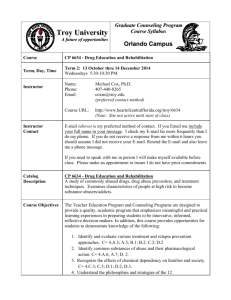instructional package
advertisement

COURSE SYLLABUS Revised September 26, 2012 COURSE PREFIX: COM-2241 COURSE TITLE: Fundamentals of Speech CONTACT HOURS: 3.0 CREDIT HOURS: 3.0 Instructor: Carolyn Demere Fall Term II October 15th – December 16th 2011 E-mail: cdemere@troy.edu Locations: Covington 5:45-10:15 Wednesday evenings COURSE DESCRIPTION: This course is an introduction to principles of public speaking with application of speaking skills. PURPOSE: COM-2241 is designed to provide students with fundamental knowledge in communication through exploration of communication theory and its application, as well as to develop students’ skills through guided practice in speaking, listening, and reading discourse of various kinds. RATIONALE: Speaking and listening competencies are vital both in the classroom and in the workplace. Studies involving both faculty in higher education, and leadership development, as well as workplace employers identify the ability to communicate as the most significant indicator for success. Accordingly, COM-2241 is designed to address the demand for competent communicators by helping students develop the communication skills needed for achievement of academic and professional goals. In addition, the knowledge that students gain from this course will help them become morecritical consumers of communication outside of work and school. REQUIRED TEXT Public Speaking for College and Career Troy University 9th Edition, 2011, Published McGraw-Hill ISBN -10-0-07-787-956-2 ISBN - 13-978-0-07-787956-3 COURSE LEARNING OUTCOMES: Students will analyze the process of communication. Explore what constitutes effective, or “good” speech in varying circumstances. Define three primary claims that speakers utilize: ethos, pathos and logos. Students will use these three primary claims in their classroom speechmaking. Identify forms and methods (both good and bad) of nonverbal communication. Evaluate verbal communication strategies. Demonstrate an appropriate mastery of public speaking concepts. Develop a more critical and discerning perspective of rhetoric, and be able to articulate insightful critiques in class. 1. Students will create effective verbal messages. Select appropriate topics. Analyze audiences. Invent appropriate speech purposes. Adapt topics to speech purpose, rhetorical situation, and audience. Organize ideas logically. Create supporting material. Discriminate among sources. Incorporate source material. Document sources APA Express ideas clearly. Reason soundly. Defend ideas logically. Students will demonstrate effective delivery skills in speaking. Demonstrate vocal characteristics that enhance the verbal message. Demonstrate use of body that enhances the verbal message. Adjust to the rhetorical situation while speaking. Create a sense of intimacy with audience members. II. Students will demonstrate skills in listening. Demonstrate listening behaviors that enhance communication. Respect others. Paraphrase the main ideas of a message. Distinguish fact from opinion. Critique the ideas and communication behaviors of the self and others. Participate effectively in classroom discussions. III. Students will judge ethical issues in communication. Recognize ethical dimensions of communication. Give their opinions of ethical issues. Evaluate alternative approaches to ethical issues. Observe reasonable ethical standards. IV. Students will use various forms of technology. Perform research using information technology. Evaluate technological resources. Contemplate a need for audio-visual elements in messages. Use presentation software effectively. Judge the use of presentation software by others. EVALUATION The instructor will assess student mastery of the course skills described above. At a minimum, the instructor will require: A fully-developed informative speaking experience; 20% A fully-developed persuasive speaking experience; 20% A fully-developed group/team presentation experience; 20% Two additional speaking experiences including an impromptu speech. 10% Additional assignments and written tests that assess mastery of the communication knowledge and skills described above. 20% Class participation 10% All speeches will evaluated by assigned criteria to include: Invention Arrangement Style Content Delivery COURSE GRADING A = 90 - 100 B = 80 - 89 C = 70 - 79 D = 60 - 69 F = less than 60 ATTENDANCE POLICY: Although you may experience emergencies, illness, or have business obligations that necessitate occasional absences from class, attendance and participation are vital. Therefore, attendance at less than 90% of the scheduled classes will result in a substantial lowering of your final course grade. You are responsible for all material covered and assignments made in your absence REQUIREMENTS: Readings, written and oral assignments, examinations, and other required work are to be completed in accordance with the schedule outlined in the syllabus. Failure to submit them by the designated date will lower the grade for the assignment. Students are bound by all written rules and regulations of Troy University.






